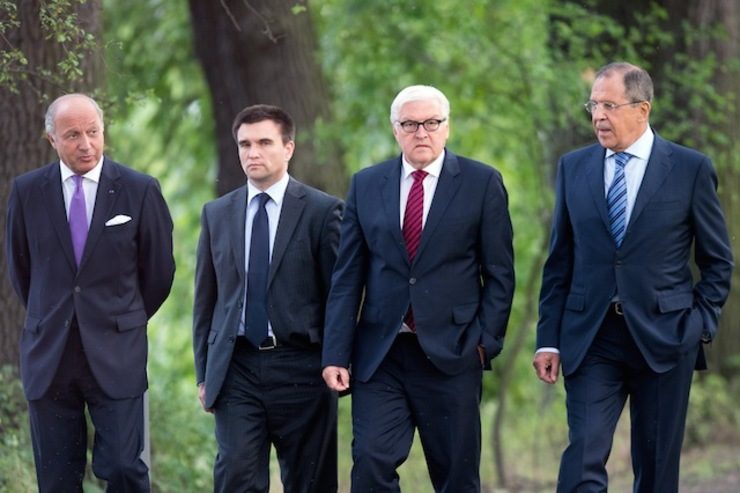SUMMARY
This is AI generated summarization, which may have errors. For context, always refer to the full article.

BERLIN, Germany – The Russian and Ukrainian foreign ministers ended “difficult” talks on the Ukraine crisis Sunday, August 17, with no concrete advances but “some progress”, hosts Germany said, as clashes continued on the ground.
“Difficult talks, but I think and I hope that we have made some progress on certain points,” Germany’s Foreign Minister Frank-Walter Steinmeier said after a five-hour meeting with Russia’s Sergei Lavrov, Ukraine’s Pavlo Klimkin and French counterpart Laurent Fabius.
“Despite the difficult climate, we have registered some progress,” a French diplomatic source confirmed to Agence France-Presse.
The nature of the progress was not disclosed by either Steinmeier or the French source.
The meeting’s participants will report back to their respective heads of government and “possibly decide on Monday or Tuesday [August 18 or 19] in which form we can resume today’s discussion”, Steinmeier said.
He stressed the need to avoid “sliding ever deeper into a direct confrontation between Ukrainian and Russian armed forces”.
“It was a necessary conversation during a difficult time,” Steinmeier told journalists after midnight local time at the talks venue, a lakeside retreat on the outskirts of Berlin, after his counterparts had left in their motorcades.
The top German diplomat said the talks were “frank”, focused on ways to reach a ceasefire and on “how to improve the still absent efficient border controls on the Russian-Ukrainian border”, as well as how to get humanitarian aid to the civilian population.
MiG fighter jet shot down
Fighting between Ukraine forces and pro-Russian separatists continued in east Ukraine on Sunday, doing little to assuage the fears of direct Russian-Ukrainian confrontation.
Around the region fierce clashes were ongoing between government forces and rebels, with Ukraine’s military saying a MiG fighter jet was shot down not far from Lugansk and the pilot parachuted to safety.
The army said it hoisted the national flag over a district police station in a northeast suburb of Lugansk after a fierce battle with separatists on Saturday, August 16.
A push into the city limits of the stricken 420,000-strong industrial hub would be a major breakthrough for government forces after four months of fighting that has claimed more than 2,100 lives and brought the region to the brink of a humanitarian catastrophe.
Lugansk, the second-largest rebel bastion, has been the scene of some of the heaviest clashes, and local authorities said that power and water were not working for a 15th day running in the increasingly deserted city.
Meanwhile, authorities in the besieged main rebel city of Donetsk said shelling there killed 10 civilians and wounded eight in 24 hours as government forces tightened the vice on rebels hunkered down there.
Ukraine also ramped up the stakes before the talks in Germany by alleging another military convoy that included three Grad rocket systems crossed over from Russia.
The fresh claims come as a furore still swirls over Kiev’s earlier boasts that it destroyed part of a Russian armored convoy which breached the frontier Thursday.
Moscow again denied claims it had sent weapons across the border to prop up the flagging separatist rebellion.
Germany also demanded that Moscow clarify rebel claims that they had received hundreds of fighters trained in Russia to shore up their insurgency.
A Kremlin spokesman denied Moscow had sent “equipment” across the border, its latest dismissal of persistent allegations by the West that it is arming the rebels.
Aid checks to start?
Meanwhile, Russia and Ukraine continued to haggle over a mammoth Russian aid convoy parked near the border as officials said inspections of the roughly 300 lorries would not start Sunday.
An Agence France-Presse journalist saw 16 trucks drive from a parking lot where they have been idling since Thursday to a Russian border post some 30 kilometers (20 miles) away.
The West and Kiev fear the convoy could be a “Trojan horse” to help the rebels in eastern Ukraine, or provide Moscow with an excuse to send in the 20,000 troops that NATO says it has massed on the border.
The International Committee of the Red Cross, which is overseeing the aid delivery, has said Russian and Ukrainian officials agreed on procedures to check the cargo – supposedly bound for Lugansk – but insisted that “security guarantees” are still needed on how the vehicles could cross rebel-held territory.
“There will be a meeting tomorrow (Monday) between all the parties involved. There will be no inspection of the lorries today,” Paul Picard, a monitor from the Organization for Security and Cooperation in Europe (OSCE) told Agence France-Presse at the border.
Ukrainian President Petro Poroshenko told US Vice President Joe Biden on Saturday that the separatists had yet to grant safe passage for the aid.
Russia’s foreign ministry has repeatedly demanded that Kiev cease fire in order for the aid to reach residents of blighted cities in eastern Ukraine who have been stuck for days without water or power.
The United Nations says more than 285,000 people have fled the fighting in the east.
There were also reports of fierce fighting in the key transport hub Yasynuvata, some 20 km north of Donetsk, following claims from Poroshenko that the town had been captured. – With Max Delany in Kiev, Ukraine, Agence France-Presse/Rappler.com
Add a comment
How does this make you feel?
There are no comments yet. Add your comment to start the conversation.